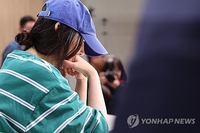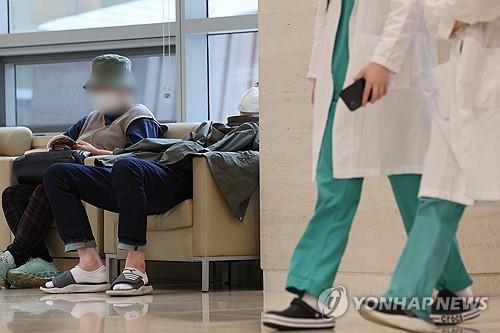(LEAD) (Yonhap Feature) Doctors widening use of VR devices to treat various mental disorders
(ATTN: CLARIFIES attribution of quotes at bottom)
By Kang Yoon-seung
SEOUL, April 29 (Yonhap) -- Nam Min-ji (alias), a 22-year-old South Korean student, dropped out of college after suffering from social anxiety. Since leaving school, she had stayed only at home and refused to make contact with anyone, becoming a basement-dweller.
While typical treatments for her would involve psychological consultations, Gangnam Severance Hospital offered a different approach in helping the patient return to everyday life. Nam was provided with a virtual-reality (VR) treatment to help her "practice" encounters she might make on a daily basis.
After two months of VR-assisted treatment provided by the Seoul-based hospital, Nam eventually gained confidence in herself and returned to school to continue her studies.
Nam is only one of the numerous people who have sought VR treatments to overcome mental illnesses.
Treatments based on VR devices are no longer science fiction. Global tech giants have been rolling out various VR devices and content, with many of them being already available on the market.
South Korea's tech giants Samsung Electronics Co. and LG Electronics Inc. have their own VR devices which connect to smartphones, struggling to create their own ecosystem in the industry.
"The study for applying VR technologies to treat disorders started in 2001 in South Korea. The full-fledged development in the program kicked off in 2003," said Kim Jae-jin, a professor of psychiatry at Yonsei University College of Medicine.
Although applying the VR technology in the realm of psychiatry began more than a decade ago, experts said the latest achievements in the tech industry over the past few years have opened a new era by sparking social awareness of the treatment.
"Previously, adopting virtual-reality technology on psychological treatments were costly and complicated," said Kim. "As the technology develops, however, such equipment has now become more affordable and simple."
According to the professor, while previous VR treatments involved costly equipment and wires, the development of mobile-based VR technology has made the treatment more accessible.
Kim, who manages the virtual-reality clinic at the hospital, added the VR treatment can be helpful in overcoming various mental illnesses from personality disorders to alcohol addictions.
The VR-based treatment is not an independent treatment by itself, but a supplement that can help patients better overcome their issues. Patients are provided with VR support along with traditional means of therapy.
The treatment at Gangnam Severance Hospital involves entering a dusky, relaxed room. The patient is then given VR glasses equipped with a tracking sensor, so that the screen moves along with the movement of the wearer's head.
Doctors can select various scenarios for the patients depending on their problems, such as "conversation with friends," "dinner plans," or "talking with a boss." Each situation shows an animated character that starts conversations with patients.
The patients then can have conversations with the characters, which are monitored by the doctors. This allows psychiatrists to understand the conditions of the patients, while the subjects can familiarize themselves with uncomfortable situations, such as standing in front of many people.
"For example, those who have trouble with cutting alcohol are given scenarios in which they are asked to have a drink by others. This way, they can practice how to turn down such tempting offers," Kim said, adding similar approaches can be made for other addictions like gambling.
"We can find solutions by having patients interact with avatars. This helps them improve relationships with others," Kim added. "Most of the patients are quite satisfied with the outcomes.
The hospital also features VR content that rotates 360-degrees to deliver more realistic experiences to the patients.
Gangnam Severance Hospital is not the only institution that has adopted the VR technology for treatments. Bundang CHA General Hospital, located south of Seoul, has also employed the technology to develop patients' cognitive functions.
"Although the VR treatment is not an independent cure itself, it can help patients improve their concentration and memory," said Professor Kim MinYoung, an expert on rehabilitative medicine at the hospital.
"Rather than sell the VR programs to patients, we are currently providing the service to patients struggling with rehabilitation," she added.
Another achievement made in the VR-medical industry is to provide the patient with a smartwatch that can track heartbeats, which tells medical experts more precise details on the conditions of the subjects.
Experts say VR treatment is also efficient for those suffering from post-traumatic stress disorder.
"The VR therapy also helps a person who lost a limb from war or an accident. It helps the patient ease the shock by showing himself as before the disaster," said Kang Byung-ju, who heads the VR business of Sidenine, a South Korean developer of contents for VR devices. "It allows the patient to face reality in a more gradual manner."
Sidenine currently develops the VR programs for CHA Hospital.
Experts added that the latest boom of VR headsets among general consumers is also a plus for the future of the VR-based medical studies.
U.S.-based industry tracker Strategy Analytics estimates the global market for VR headsets to reach US$895 million this year.
The increase in the number of VR devices sold will lead to a boom of home-based VR psychological treatments, industry watchers added.
"Currently, there aren't enough programs available. But hospitals are expressing deep interest in the sector. We can say the treatments are quite effective," Kang said.
As a wider scope of users are being familiarized with VR technology, patients of various age groups are knocking on the doors of the clinic.
According to the hospital, most of the patients seeking VR help are people who are struggling at work. But even the elderly aged above 60 are also expressing interest in hopes of overcoming trauma.
"South Koreans are more familiar with VR devices. Those in their 40s and 50s are also accustomed to the latest technology. I believe more people will use VR therapies to fight Alzheimer's, when the generations get older," Kang added.
"Many say the key areas of the VR industry are gaming and pornography. But I believe that the medical segment is also significant," Kang said. "The market for VR-based medical treatment will jump as more people utilize the technology for simpler activities at home.
The rush to tap the VR medical treatment is a global trend, experts said.
"Each country has its own area of focus. For example, the United States boasts strong presence in the treatment of post-traumatic stress disorder," Kim Jae-jin said. "South Korea focuses on treatments involving social interactions. In terms of technology, we do not lag behind other countries."
Gangnam Severance Hospital is now starting a new project to lend a hand to those suffering from gaming addiction. As such, South Korean medical experts are tapping deeper into VR treatment, casting a brighter outlook over the industry.
"The South Korean government should expand support on promoting the VR medical industry," Kim MinYoung said, hoping the country will utilize its top IT and medical technology.
She added the latest boom of artificial intelligence also implies another opportunity for the VR medical industry.
"On the back of the artificial intelligence (AI), we can significantly improve the quality of the VR treatment," Kim MinYoung said. "For example, the AI can guide elderly patients within VR programs. There is so much potential."
colin@yna.co.kr
(END)
-
 'Queen of Tears' weaves rich tapestry of Korean contemporary art
'Queen of Tears' weaves rich tapestry of Korean contemporary art -
 Ateez member Yunho throws first pitch at MLB match between Dodgers, Mets
Ateez member Yunho throws first pitch at MLB match between Dodgers, Mets -
 N. Korea says Kim guided simulated nuclear counterattack drills for 1st time
N. Korea says Kim guided simulated nuclear counterattack drills for 1st time -
 N. Korea calls envisioned U.S. aid to Ukraine 'hallucinogen'
N. Korea calls envisioned U.S. aid to Ukraine 'hallucinogen' -
 N. Korea calls on party propaganda officials to work harder
N. Korea calls on party propaganda officials to work harder
-
 'Queen of Tears' weaves rich tapestry of Korean contemporary art
'Queen of Tears' weaves rich tapestry of Korean contemporary art -
 Experts see possibility of N.K. conducting nuclear test before U.S. presidential vote
Experts see possibility of N.K. conducting nuclear test before U.S. presidential vote -
 N. Korea says Kim guided simulated nuclear counterattack drills for 1st time
N. Korea says Kim guided simulated nuclear counterattack drills for 1st time -
 Looming weekly closure of major hospitals feared to worsen medical service crisis
Looming weekly closure of major hospitals feared to worsen medical service crisis -
 N. Korea calls envisioned U.S. aid to Ukraine 'hallucinogen'
N. Korea calls envisioned U.S. aid to Ukraine 'hallucinogen'
-
 Indonesia coach left with mixed feelings after eliminating native S. Korea in Olympic football qualifiers
Indonesia coach left with mixed feelings after eliminating native S. Korea in Olympic football qualifiers -
 S. Korea eliminated in Olympic football qualifiers as poor defense, undisciplined play prove costly
S. Korea eliminated in Olympic football qualifiers as poor defense, undisciplined play prove costly -
 ADOR CEO calls conflict with Hybe 'worst experience of my life'
ADOR CEO calls conflict with Hybe 'worst experience of my life' -
 (LEAD) 10-man S. Korea lose to Indonesia to miss out on Paris Olympic football qualification
(LEAD) 10-man S. Korea lose to Indonesia to miss out on Paris Olympic football qualification -
 S. Korea to acquire SM-3 shipborne missiles by 2030
S. Korea to acquire SM-3 shipborne missiles by 2030




















